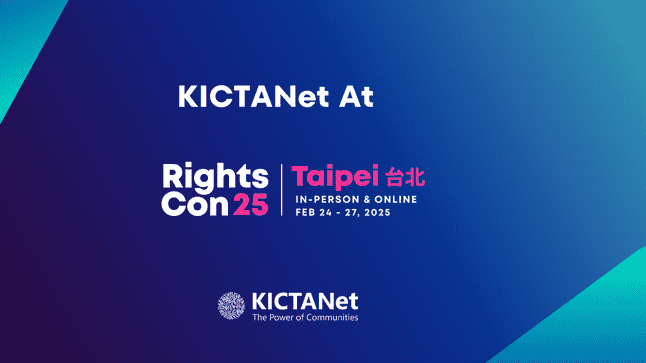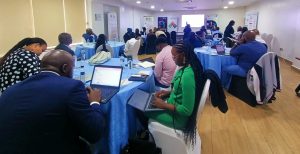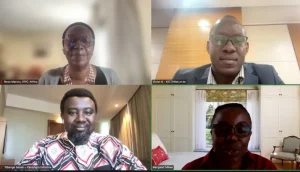Taiwan’s path to democracy has been marked by decades of struggle, from 37 years of martial law to political prosecutions and digital threats from authoritarian regimes. As a technologically advanced society, Taiwan has faced cyberattacks, disinformation campaigns, and digital surveillance, yet it continues to champion democracy and human rights in the digital age.
Dr. Alejandro Mayoral Baños, Executive Director of Access Now, opened RightsCon 2025 by acknowledging Taiwan’s indigenous peoples, particularly the Ketagalan people of Taipei. He emphasized that indigenous communities are not relics of the past but active bearers of cultural traditions and resilience. Mayoral Baños urged attendees to explore Taiwan’s indigenous heritage through institutions like the Formosa Indigenous Museum and the National Human Rights Museum, which highlight historical struggles for justice and freedom.
He drew parallels between indigenous technologies and modern digital rights, noting that ,indigenous innovations, such as the Tao people’s traditional fishing boats and the Ifugao race terraces in the Philippines, embody principles of sustainability, resilience, and communal governance.
” These values, should guide efforts to combat digital colonization, unchecked AI development, and state-led surveillance,” argued Dr. Alejandro.
A Gathering of Digital Rights Defenders
Nikki Gladstone, RightsCon Director at Access Now, reflected on RightsCon’s journey over the past twelve years, marking its return to the Asia-Pacific region for the first time since Manila a decade ago. With over 3,244 participants, this edition stands as the largest in RightsCon history, demonstrating the global commitment to digital rights despite increasing challenges.
Gladstone acknowledged the growing restrictions on civil society participation in decision-making spaces and the democratic backsliding seen worldwide.
” RightsCon remains a space for open, hard-hitting conversations that lead to real-world change. As the digital rights ecosystem faces heightened attacks, stronger collaborations and meaningful engagement to uphold human rights in the digital age, “said Nikii
Taiwan’s Leadership in Digital Rights and Governance
Taiwan’s Vice Premier, Cheng Li-Chiun, outlined the country’s response to global digital challenges.
“It is importance to redefine civic rights and government responsibilities in the digital era” emphasized Cheng Li- Chun.
Taiwan has made significant strides in:
- Amending cybersecurity laws to address emerging threats.
- Enhancing data protection and drafting basic AI legislation to balance innovation with ethical considerations.
- Promoting good technology governance to ensure trust and sustainability in the digital space.
- Strengthening global digital solidarity, recognizing that collective action is essential in tackling cross-border digital rights issues.
Fighting Digital Threats with Innovation and Cooperation
Vice President Hsiao Bi-khim reflected on Taiwan’s transition from martial law to democracy, highlighting the continued threats from cyberattacks and digital authoritarianism. She noted that Taiwan faces 2.2 million cybersecurity threats daily, requiring constant vigilance and innovation.
Taiwan’s approach includes:
- Annual presidential hackathons to crowdsource solutions to digital threats.
- Strengthening digital inclusivity through international cooperation.
- Addressing the risks of AI, online disinformation, and surveillance while fostering a responsible digital environment.
“During this week, RightsCon participants need to engage in meaningful discussions and contribute to shaping a safer and more inclusive digital future,” says Hsiao Bi-khim.
Asia’s Growing Influence in the Digital Landscape
“ Asia is no longer just shaping the future of the internet—it is already the present. With the majority of the world’s internet users, hardware manufacturing, and software development based in the region, Asia-Pacific must take a leading role in global digital governance.” emphasized, Raman Jit Singh Chima, Asia Policy Director at Access Now,
However, Chima warned that digital rights in the region remain under severe attack. In 2024 alone, 202 internet shutdowns were recorded across 11 countries, with Myanmar, India, and Pakistan accounting for 64% of short-term blackouts. He stressed that digital rights advocacy must evolve to meet the growing challenges of state-sponsored censorship, platform governance, and AI-driven inequities.
A Call to Action
As RightsCon 2025 convenes in Taipei and online, the message is clear: the fight for digital rights requires resilience, collaboration, and strategic mobilization. Whether addressing state surveillance, platform accountability, or the ethical deployment of AI, participants are urged to forge new alliances and push for meaningful change.
Inspired by the resilience of indigenous technologies and the steadfast commitment of digital rights defenders, RightsCon 2025 serves as a powerful reminder that the future of digital governance lies in our collective hands.
As part of this global effort, KICTANet commits to amplifying African voices in digital rights advocacy, fostering multi stakeholder dialogue, and driving policy reforms that safeguard human rights online. By leveraging its expertise in technology governance and community-driven engagement, KICTANet will continue to champion an inclusive, rights-respecting digital future.
Now is the time to act.
Blog by, Neema Mujesia , Communications Officer at KICTANet
![]()




